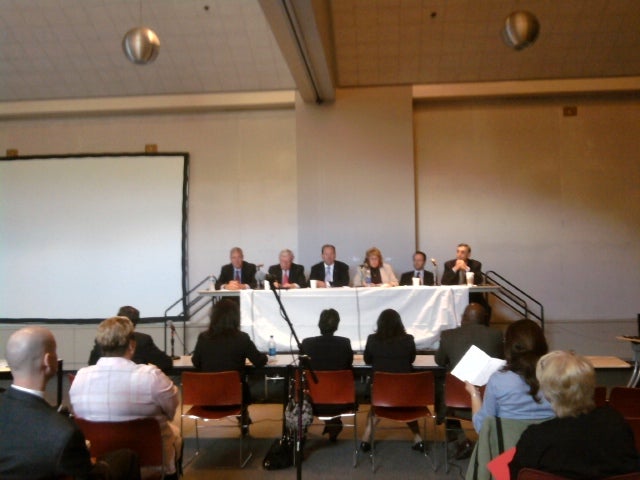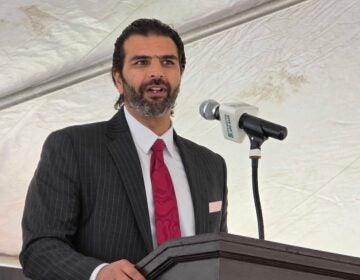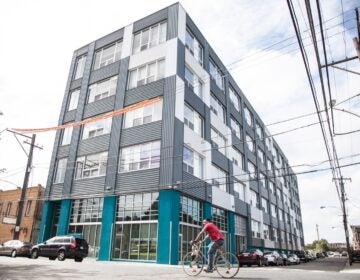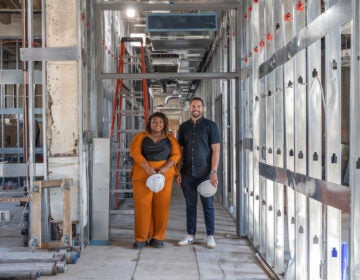SugarHouse pushing for table games

SugarHouse Casino has made its pitch to offer table games to the state’s gaming control board.
General Manager Wendy Hamilton said the poker, blackjack, craps and roulette SugarHouse plans to offer would bring new employees to the city. Three hundred of the 800 jobs the casino would have on opening day would be tied to table games if the board grants a certificate, she said.
That decision will be made at the board’s next meeting, Tuesday, May 25 in Harrisburg.
https://www.youtube.com/watch?v=Rfjvu-eFyVM
SugarHouse testimony at the table games hearing. Watch part 2, part 3, part 4, part 5.
Hamilton introduced the board to the casino’s new director of table games, Rose Cook, who has 22 years of experience in that field and helped open the Borgata in Atlantic City. Cook spoke of the importance of training for dealers and said it would include CPR and gambling problem awareness training. She and other officials who spoke promised to hire a diverse and local workforce. Cook said SugarHouse plans to offer dealer school for 10 weeks in July and August. Classes will be offered at different times of the day, and during the week and on weekends, so that they can fit into applicants schedules more easily. “I am a product of the original dealer school in Atlantic City, New Jersey,” Cook said. “I’ve made a full career out of this.”
SugarHouse spokeswoman Leigh Whitaker told the board that about 10,000 people came to a recent SugarHouse job fair, and that to date, the company has donated about $400,000 to community causes. She also reported that the casino will have a green roof.
In response to a question by gaming board chairman Gregory Fajt, Whitaker said that some attendees of the neighborhood job workshops SugarHouse has held had never before compiled a resume.
Fajt also asked about the river access SugarHouse would provide the public, saying he knew that had been an issue in Philadelphia. Hamilton said that a multi-use trail would lead through the casino property along the south side of the building, then wrap around the front of the building and head north up the river’s edge. For a time, she said, the trail, which is part of the city’s long-range plan for the central Delaware, won’t really lead anywhere. But eventually, the property owner to the north will build its portion of the trail, and pedestrians and bicyclists will be able to go from the casino to Penn Treaty Park.
Gaming Control Board member Kenneth Trujillo asked SugarHouse attorney John Donnelly about financing, and Donnelly replied all the money was in place for the project. He did not offer any details.
At the beginning of the public comment period, letters of support from local elected officials, including State Sen. Larry Farnese and Mayor Michael Nutter, were introduced into the record. An excerpt from a long statement opposing casinos, submitted by Eastern Pennsylvania Citizens Against Gambling, was also read. Then, the public got their chance.
The 60 or so audience members included both casino opponents and proponents. About 10 members of Casino-Free Philadelphia held signs that said “Enough Already.” At times, some of them quietly hissed in response to pro-casino statements.
Table games supporters spoke of the jobs casinos would bring, the money SugarHouse has given to the community, and the need for SugarHouse to have table games to compete with the casinos in Atlantic City.
Katherine Rhoads, a lifelong resident of Fishtown and a member of Fishtown ACTION, the community group that splintered off from Fishtown Neighbors over the casino issue, said that with the addition of table games, SugarHouse would attract more tourists and more revenue.
Opponents spoke of gambling addiction, oversaturation of the gaming market, and the fact that other Pennsylvania casinos have experienced layoffs.
Casino-Free Philadelphia organizing director Lily Cavanagh politely told the board that only allowing people who had pre-registered to speak was a bad idea, as some people wanted to comment based on what they heard. She said that slots and table games would never live up to their economic promises, particularly in this climate, and that some of the jobs being touted were going to be lost to layoffs, just as has happened at other Pennsylvania Casinos, like Sands. Cavanagh then turned over much of her alloted time to other Casino-Free members.
https://www.youtube.com/watch?v=DKbp9vgRa5E
Members of the public spoke both for and against the proposal. Watch part 2, part 3.
As passionately as Rhoads had spoken in favor of SugarHouse, Andrea Preis spoke against it. She also took the board to task, saying that at all the meetings she’s attended, they have never spoken about the money casinos make from problem gamblers. She said the questions the board asked of SugarHouse on Wednesday about job creation and river access amounted to “a venue for the glorification of this predatory enterprise.
Trujillo thanked the speakers from the public for taking time out of a work day to come to the meeting. To the casino opponents, he said he disagreed with their comments that the casinos are not a good idea from a financial point of view. “The numbers are hard to argue with. The state has received nearly $4 billion in tax revenue,” he said.
https://www.youtube.com/watch?v=zGXYRT3feT4
Trujillo addresses the public. Hearing officer Linda Lloyd describes what comes next.
But Trujillo, who before his appointment to the board was one of the investors in the failed Riverwalk Casino proposal, said some casino impacts are yet to be determined. “Where the jury is still out is the social issues you describe,” he said, encouraging the opponents to “continue their advocacy” so that the gaming board didn’t lose sight of that.
VIDEOS TO FOLLOW
Contact the reporter at kelliespatrick@gmail.com
WHYY is your source for fact-based, in-depth journalism and information. As a nonprofit organization, we rely on financial support from readers like you. Please give today.






